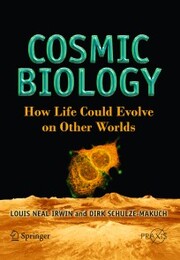-
Zusatztext
-
<p>In<b>Cosmic Biology</b>, Louis Irwin and Dirk Schulze-Makuch guide readers through the range of planetary habitats found in our Solar System and those likely to be found throughout the universe. Based on our current knowledge of chemistry, energy, and evolutionary tendencies, the authors envision a variety of possible life forms. These range from the familiar species found on Earth to increasingly exotic examples possible under the different conditions of other planets and their satellites.</p><p>Discussions of the great variety of life forms that could evolve in these diverse environments have become particularly relevant in recent years with the discovery of around 300 exoplanets in orbit around other stars and the possibilities for the existence of life in these planetary systems. The book also posits a taxonomic classification of the various forms of life that might be found, including speculation on the relative abundance of different forms and the generic fate of living systems. The fate and future of life on Earth will also be considered. The closing passages address the Fermi Paradox, and conclude with philosophical reflections on the possible place of Homo sapiens in the potentially vast stream of life across the galaxies.</p>
-
-
Kurztext
-
This text discusses a broad range of possible environments where alien life might evolve in our universe. It also uses current knowledge of chemistry, energy and evolutionary tendencies to consider possible life forms ranging from the familiar to the exotic.
-
-
Autorenportrait
- <p>As a neurobiologist, Louis Neal Irwin has been a student of evolution, complexity, and behavior over a 40 year career of academic teaching and research. Irwin has published close to 60 original research articles, literature and book reviews, encyclopedia entries, and commentaries on the brain, behavior, and evolution, including one book ("Scotophobin") on the early development of neuroscience.</p><p>Ten years ago, Irwin became a Solar System Educator for NASA, originally in conjunction with the launch of the Cassini-Huygens Mission to Saturn but later as representative for all the robotic exploratory missions managed by the Jet Propulsion Lab. In that capacity he became familiar with the details of space exploration for the purpose of conducting teacher workshops. Soon thereafter, he also began a collaboration with Dirk Schulze-Makuch on research into the definition of life and the plausibility of searching for and finding life onother worlds. As NASA turned its attention to the emerging field of astrobiology, Schulze-Makuch and Irwin began to publish their research in that area, culminating in the joint authorship of "Life in the Universe: Expectations and Constraints," which many regard as the definitive work in the field of astrobiology for the technical specialist.</p><p>Dirk Schulze-Makuch</p><p>As a trained hydrogeologist Dirk Schulze-Makuch entered the field of astrobiology by studing extremophilic organisms in hot springs. Propelled by a major NASA grant Dirk then joined the Europa Focus Group and some time later the Titan Focus Group of the NASA Astrobiology Institute. Recent interests include nearly all aspects of astrobiology including mission-aligned efforts to detect life on Mars and the search for extraterrestrial intelligence.</p><p></p>
Detailansicht
Cosmic Biology
eBook - How Life Could Evolve on Other Worlds, Springer Praxis Books
ISBN/EAN: 9781441916471
Umbreit-Nr.: 1830631
Sprache:
Englisch
Umfang: 338 S., 143.15 MB
Format in cm:
Einband:
Keine Angabe
Erschienen am 08.12.2010
Auflage: 1/2010
E-Book
Format: PDF
DRM: Digitales Wasserzeichen


